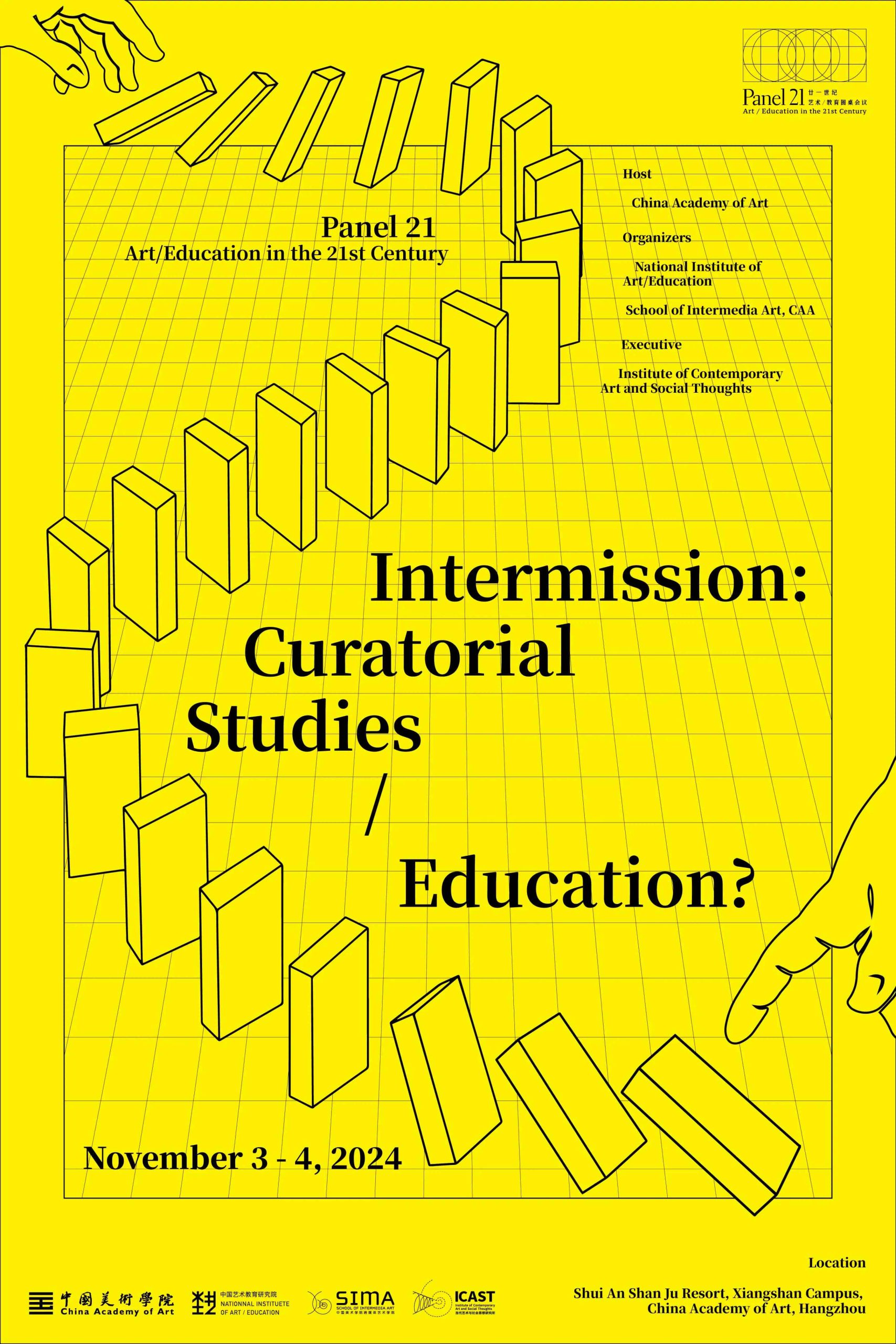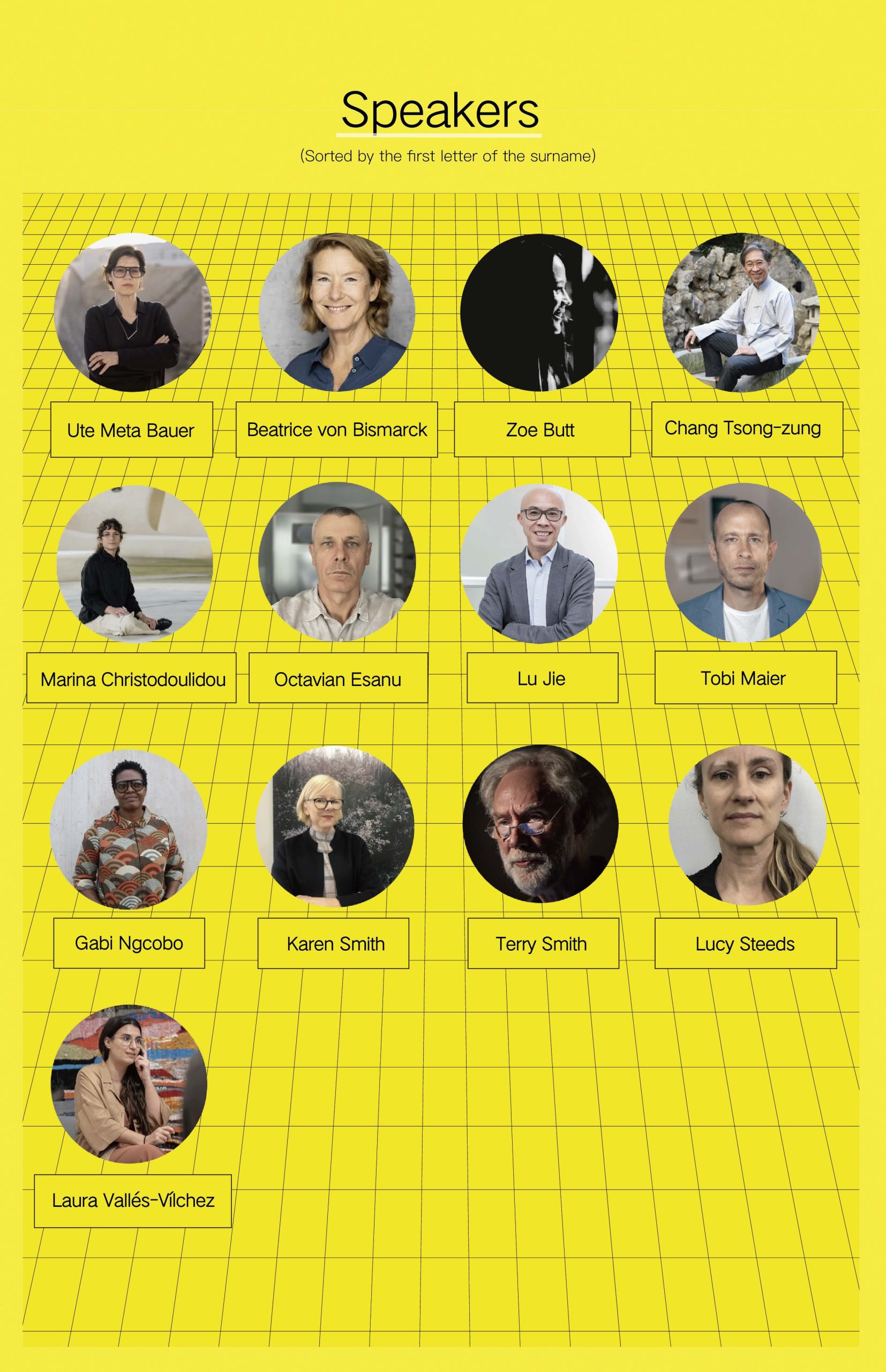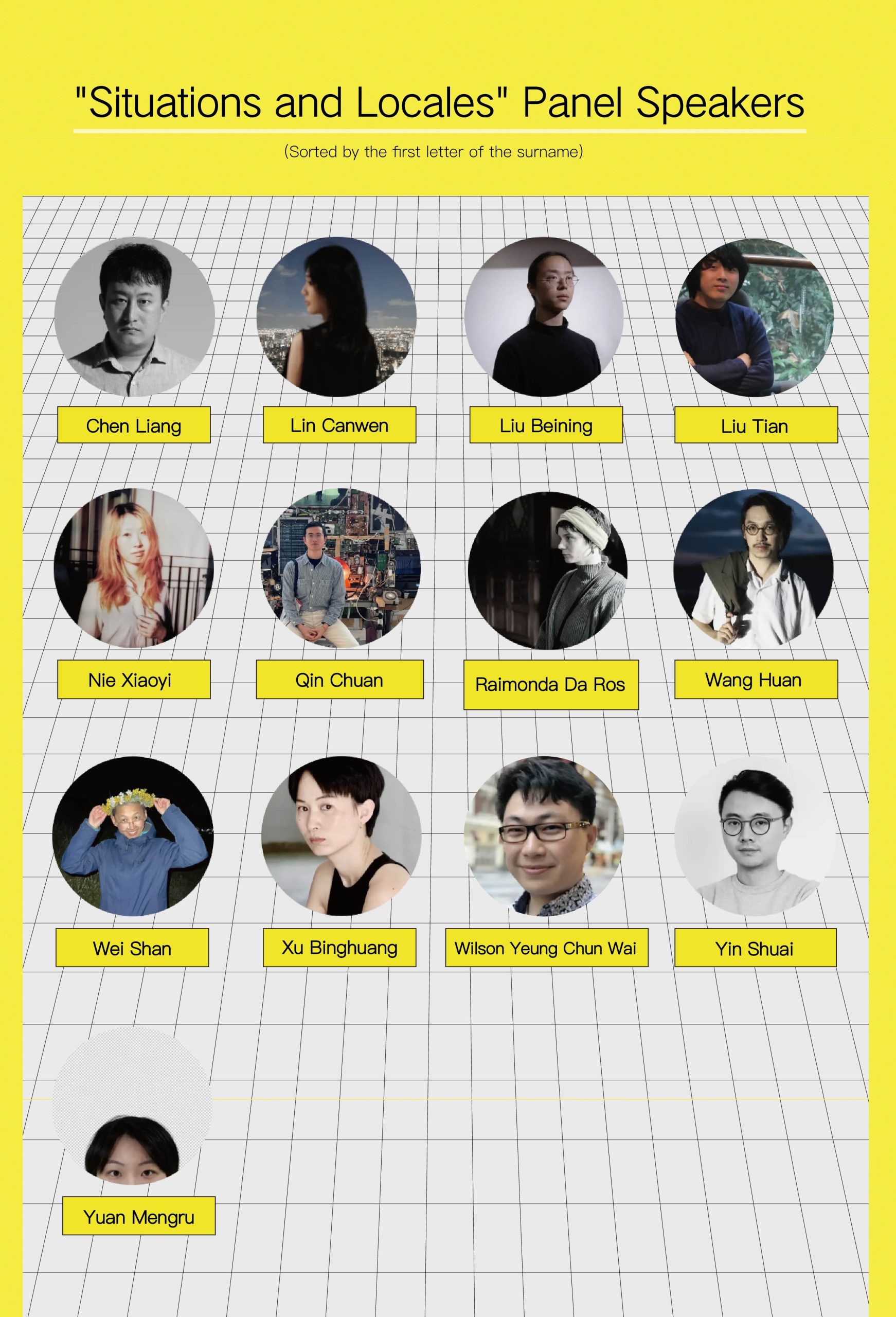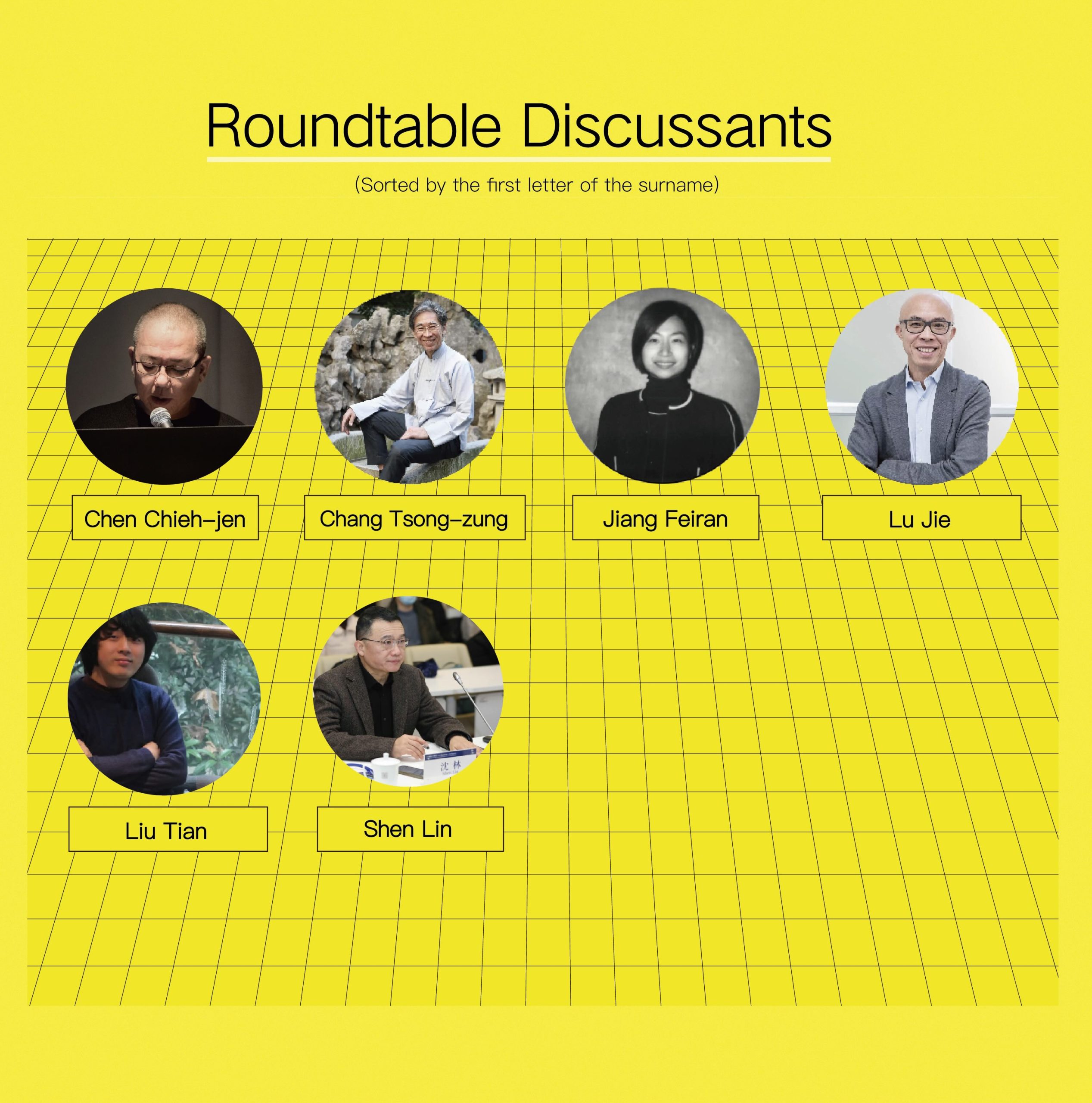2024.11.03-2024.11.04

Dates
November 3-4, 2024
Location
Shui An Shan Ju Resort, Xiangshan Campus, China Academy of Art
Host
China Academy of Art
Organizers
National Institute of Art/Education, CAA
School of Intermedia Art, CAA
Convener
Institute of Contemporary Art and Social Thoughts, CAA
Intermission: Curatorial Studies/Education?
"Panel 21: Art/Education in the 21st Century," hosted by the China Academy of Art, is about to commence. This symposium has invited 13 leaders from international curatorial education departments, experts from museums, biennales, and foundations focused on curatorial research and education, as well as professionals engaged in local curatorial practices, research, and education from collectives, self-organized groups, and experimental institutions. Together, they will gather to discuss the history, present, and future of curatorial education. In addition, the symposium features a special section titled "Moments and Sites," which received 65 submissions from around the world through an Open Call. From these, 12 young participants were selected, providing a platform for young curators, researchers, and practitioners of curatorial education to express their ideas and engage in dialogue. During this "Intermission" moment, we will rethink curatorial research and education.
"Intermission: Curatorial Studies/Education?" stems from a sense of reality: we seem to be in a period of stagnation in both art and human history at this moment. The previous act has ended, while the next has yet to begin. The grandeur of the past has faded, and the new historical tone is still awaiting its definitive articulation—awkward "intermission" is still in search of its Mission.
The "intermission" is not only an "intermission" for contemporary art but also for broader cultural and political realities. For art today, it is both the background and, more importantly, the working object. We observe that the activities of the art world are increasingly caught in an involution cycle turning into a stagnated routine carnival that occurs regularly at different intervals. On the other hand, technology and the social structures it shapes are rapidly changing, chaotic opinions (doxa) are becoming more cacophonous and divisive, people are constantly being segmented and polarized... Those phenomena have naturally become the material for much of today's art creation and exhibitions. However, this still falls short of the preparation needed to open a new big play.
From the space where art and works emerge, tracing back to the theater of mass media, society, and art, a complex cycle of symbols, power, meaning, and value gradually appears. We find ourselves in this "intermission" moment. The current situation is all too familiar: contemporary art is undergoing a global crisis, and artists are struggling in a state of double powerlessness, having lost the ability to shape history and lead. We have entered a "post-historical" condition, calling for a rethinking of art's political nature and space, as well as a rediscovery of self-perception and history. In such an "intermission", filled with deep spiritual crisis and paralyzed action, how can we navigate through the immense vortex both inside and outside the theater, break through the seamless links of meaning fabricated by the art system, and transform this "intermission" into an opportunity to reignite action?
This stagnant "intermission" may also present an opportunity—a chance to break the stillness through questioning: within the political economy of contemporary art, what is suppressing the power of the spirit? What is causing our dissatisfaction? What is obstructing the path to liberation? How can we clearly describe this condition? How can we escape the deadlock of artistic creation? How can we discover the inner frontiers of the "art world" that has been captured by global capitalism? Is it possible for contemporary art practices to pioneer a new mode of production? And as curatorial action has long served as a radical force, could it become a fulcrum to transcend this "intermission"? How can curatorial education sow the seeds for such change?
The "intermission" is also a time for reflecting on education, as its mission is to continually create new subjects. What this "intermission" needs to produce is not only new knowledge but, more importantly, new pathways for knowledge production. Beyond scientific and speculative knowledge, new paradigms of knowledge must be explored. Art is the path jointly evolved by the two mental states of "teaching" and "learning". This path guides us to continually critique and experiment. We reinterpret reality with our sensitivity, and we propose ideas to society and the times with our imagination. This process itself is a form of curatorial education.
Art can be seen as a curatorial form of life education, integrating the education of nature, aesthetics, and life into a unified whole, aimed at fostering and shaping the "new generation" and "new knowledge". The liberation of both humanity and art is the fundamental premise and purpose of our gathering at this moment, as we collectively explore the potential of curatorial studies and education.
Agenda
9:00-9:20 Opening Remarks by Min Han (Vice Dean of the School of Intermedia Art, CAA)
11/3/2024 Forenoon Keynote Speech
9:10 - 10:30 Questions and Horizons Moderator: Lu Jie Lu Jie Introduction: Intermission Terry Smith World Questions—For Contemporary Curatorial Education Chang Tsong-zung Art Education as a Curatorial Program of Human Livingness
10:45 - 12:10 Thoughts and Methods Moderator: Lu Jie Beatrice von Bismarck Becoming Guest Ute Meta Bauer Curare Is a Poison Gabi Ngcobo Withdrawal: An Unteachable Strategy
11/3/2024 Afternoon Keynote speech 14:00 - 15:50 Context and Approach Moderator: Chang Tsong-zung Octavian Esanu Exhibition-Making as Counter-Hegemonic Practice: The Postcolonial and Postsocialist Zoe Butt Learning to Unlearn: Mentoring the Mattering of What Stories Tell Stories Laura Vallés-Vílchez How Can an Unhurried Politics of Attention Reshape Curatorial Pedagogies? Tobi Maier How Can Curatorial Practice in the Public Realm Help Us Reach New and Wider Audiences? How Can We Reflect on the Practice of Education and Learning Through Collectively Organized Exhibition Projects?
16:05 - 17:30 Research and Education Moderator:Chang Tsong-zung Lucy Steeds What Does Study of Exhibition Histories Offer Future Curators? Karen Smith De Ying Curatorial Fellowship: A Thinking Context for Young Curators in China Marina Christodoulidou Assembling Land: Rehearsals Towards Place-Making
11/4/2024 Forenoon Special Panel "Situations and Locales" Conveners: Liu Beining, Chen Zhanhao, Yang Qichen9:00 - 10:55 First Half Moderator: Liu Tian Liu Tian Panel Introduction: Curation-Education Wilson Yeung Chun Wai Curating In-Between: A Collective Approach to Curatorial Practice and Education Yin Shuai Education as Curating Lin Canwen Studying-Doing-Teaching: Questions about Curating Qin Chuan The Academy Is Roaring Back Nie Xiaoyi From Curating to Cedong: The Necessity of Self-Mobilisation Raimonda Da Ros "To Patch a 283 Years Old Wound": Ways to Rethink the Curatorial in the Upcoming Decade
11:10 - 12:40 Second Half Moderator: Jiang Feiran Xu Binghuang Living as Learning: Engaging in Non-Degree Educational Spaces from the Perspective of Curatorial Practice Liu Beining Shanshui, Around the Fourth Century and the Twentieth Century Wang Huan How to Learn from the Folk: Curating, Cultural Power, and the Texture of Humanity Chen Liang Rituals, Writing, and Social Governance Yuan Mengru The Nine Billion Names of Art Wei Shan Beginning with the End: Preparation for Death
11/4/2024 Afternoon Roundtable Discussion14:00 - 17:30 All Speakers + Discussants Discussants Lu Jie, Chang Tsong-zung, Shen Lin, Chen Chieh-jen, Liu Tian, Jiang Feiran

Ute Meta Bauer
Ute Meta Bauer is an educator and curator in the field of contemporary art. She is a Professor at the School of Art, Design and Media at Nanyang Technological University (NTU), and currently a Principal Research Fellow at the NTU Centre for Contemporary Art Singapore (NTU CCA Singapore), a research centre she led as Founding Director for more than a decade. In 2020, she curated the Singapore Pavilion at the 59th Biennale di Venezia, and was a curator of the 17th Istanbul Biennial. Most recently, in 2023/2024, she served as Artistic Director of the Diriyah Contemporary Art Biennale 2024.
Beatrice von Bismarck
Beatrice von Bismarck teaches Art History, Visual Culture and Cultures of the Curatorial at the Academy of Fine Arts (Hochschule für Grafik und Buchkunst) Leipzig. She worked as a curator in the department of 20th-century art at the Städel Museum, Frankfurt and taught at the Leuphana University in Lüneburg, where she was co-founder and co-director of the Kunstraum. In Leipzig, she was initiator of the MA program Cultures of the Curatorial, which began in autumn 2009. In 2018 she was Philippe Jabre Visiting Professor of Art History and Curating at the American University of Beirut.
Zoe Butt
Zoe Butt is a curator, writer and educator, nurturing critically thinking and historically conscious artistic communities, fostering dialogue among cultures of the globalizing souths. Possessing an extensive exhibition, publishing and public-speaking history globally, in 2022, she founded “in-tangible institute”, seeking a robust ecology for locally-responsive curatorial talent in Southeast Asia. Zoe is currently Lead Advisor (Southeast Asia and Oceania), Kadist Art Foundation; and Lecturer, Curatorial Practice, Chulalongkorn University, Bangkok.
Chang Tsong-zung (Johnson Chang)
Chang Tsong-zung is an independent curator, guest professor at CAA (Hangzhou, China), Director of Hanart TZ Gallery (Hong Kong), and co-Founder of ICAST. He is actively involved in ICAST curatorial projects, forums, and education. He has made significant contributions to the formation of the 3 Parallel Artworlds conceptual framework and has played an important role in supporting and promoting various curatorial and forum projects initiated by Inter-Asia School. He has curated Chinese exhibitions since the 1980s and was the co-curator of the Guangzhou Triennial, the 9th Shanghai Biennale, etc.
Marina Christodoulidou
Marina Christodoulidou is a researcher and curator based between Amsterdam and Nicosia. Traversing curatorial formats, her work emerges from socially engaged and self-organized practices, often taking the form of discursive exhibitions, writing, film, and architecture. She is currently a curatorial research fellow at de Appel, focusing on questions around land, housing, and self-governance. Marina also tutors at de Appel’s COOP study program Assembling Land at the Dutch Art Institute (DAI), co-led with artist Noor Abuarafeh (2023–25).
Octavian Esanu
Octavian Esanu is an Associate Professor at the American University of Beirut (AUB) and director/curator of AUB Art Galleries. In the late 1990s he was the founding director of the Soros Center for Contemporary Art, Chisinau producing the first exhibitions of contemporary art in Moldova. In the early 2010s, he was part of the editorial team responsible for establishing the ARTMargins Print journal, and since 2012, he has served as the founding director and curator of AUB Art Galleries.
Lu Jie
Lu Jie is the director of ICAST and the founder of the Long March Project and Long March Space. Lu Jie is the author and editor of multiple artist monographs, comprehensive art volumes, and art historical publications, as well as curator of several contemporary art exhibitions and academic forums. He has lectured and taught at art schools, museums, and art institutions worldwide and has served as a consultant and juror for international and Chinese contemporary art foundations and art institutions.
Tobi Maier
Tobi Maier is an art critic, curator and editor and holds the position of Chief Curator at Amant, Brooklyn, NY. He directed Lisbon’s Municipal Galleries between February 2019 and December 2022. Previously he organized the exhibition space SOLO SHOWS in São Paulo (2015-2018), worked as an associate curator for the 30th edition of the Bienal de São Paulo (2012), as a curator at Ludlow 38 in New York (2008–2011) and at Frankfurter Kunstverein in Frankfurt am Main (2006–2008).
Gabi Ngcobo
Gabi Ngcobo is the current Director of Kunstinstituut Melly, Rotterdam, NL. Between 2020 and 2023 she was Curatorial Director at the Javett Art Centre at the University of Pretoria (Javett-UP). Gabi has lectured for eight years in the art department of the Wits School of Arts in Johannesburg. She curated the 10th Berlin Biennale and was one of the co-curators of the 32nd Sao Paulo Bienal. She was also part of the Founding Commission of documenta 15 and a founding member of Nothing Gets Organised (2016-) and the Center for Historical Reenactments (2010–14).
Karen Smith
Resident in China since 1992, Karen Smith is a curator/writer focused on contemporary art practices relevant to China. Starting her career as an independent practitioner, Smith was appointed founding director of OCAT Xi’an contemporary art centre in 2012. In 2021, Smith joined De Ying Foundation, to lead its academic initiatives, where she currently runs the foundation’s Curatorial Fellowship, launched spring 2022. She has curated numerous exhibitions in China and abroad. She has also produced artist texts for an extensive list of exhibition catalogues and artist monographs.
Terry Smith
Terry Smith is Emeritus Professor of Art History at the University of Sydney, and Andrew W. Mellon Emeritus Professor of Contemporary Art History and Theory in the Department of the History of Art and Architecture at the University of Pittsburgh. He is Professor in the Division of Philosophy, Art and Critical Thought at the European Graduate School, Professor at Large of The Africa Institute, Global Studies University, Sharjah, and Faculty at Large, Curatorial Program, School of Visual Arts, New York. He is a Fellow of the Australian Academy of the Humanities. In 2010 he was named the Australia Council Visual Arts Laureate and won the Mather Award for art criticism conferred by the College Art Association (USA).
Lucy Steeds
Lucy Steeds is a writer, teacher and occasional curator based in Argyll, Scotland and working at Edinburgh College of Art, University of Edinburgh. Her research centres on art in its public moment, historically and around the world, where this has challenged norms in ways that are useful to reflect on here and today. She is a series editor for the Exhibition Histories books published by Afterall, University of the Arts London, in association with: Asia Art Archive, Hong Kong; the Center for Curatorial Studies, Bard College, New York; documenta Institut, Kassel; and the Faculty of Fine, Applied and Performing Arts, University of Gothenburg.
Laura Vallés-Vílchez
Laura Vallés-Vílchez is a curator, editor and researcher. In 2022, she earned her PhD from the Royal College of Art in London, where she currently resides. There, she teaches curatorial studies and directed the European initiative 4Cs: From Conflict to Conviviality through Creativity and Culture. Her is co-founder and director of Concreta, an independent publishing house known for its journal and book series. In 2022, Laura co-designed Articulacions: an experimental educational programme at the IVAM museum in Valencia in partnership with Universitat de València and Universitat Politècnica de València.

Chen Liang
Chen Liang is an artist and ethnographic researcher. Perennial fieldwork in eastern Gansu, northern Shaanxi, and the South Taihang villages. He creates and researches on local knowledge, folk rituals, and the origins of human writing. Focuses on the rituals, the cult of writing, and the ideas that emerge from them in local societies. In this way, he tries to outline an ideological slice for studying local societies and rediscover the history, humanity and social governance in local knowledge.
Lin Canwen
Lin Canwen, PhD in Art, curator, artist. In 2023, she obtained her doctoral degree in Visual Culture and Curatorial Studies from the Institute of Contemporary Art and Social Thought (ICAST) at the China Academy of Art, where she had previously earned her master's degree in Contemporary Art and Curatorial Practice. Her research and practice focus on the construction of “inter-history” behind general creative activities, and her research interests include contemporary art, media studies, and cultural consumption. She currently teaches experimental art and curating courses at the Shanghai Academy of Fine Arts.
Liu Beining
Liu Beining is an artist, curator and dancer. He is a graduate of both the China Academy of Art and Pratt Institute's Graduate School of Fine Art and is at present studying at Doctoral Level on the course of the CAA's Institute of Contemporary Art and Social Thought. In his practice he often takes drawing and writing as points for departure and extending to the intertwined presentation of sculptural and curatorial issues. In his works and researches, he has long been concerned with the concept of gaps in translation issues, the traditions of Shanshui and other knowledge/political images, and the mutual compensation of history/time mentalities.
Liu Tian
Liu Tian is the Executive Director and Lecturer of ICAST; Ph.D in Visual Culture and Curatorial Studies. He was the member of the curatorial collegiate of the 11th Shanghai Biennale: Why Not Ask Again: Arguments, Counter-arguments and Stories, the Chief Curator of Being Theoria: 4th Hangzhou Triennial of Fiber Art in 2022, and jury member on several art prizes including the Hyundai Blue Prize ART+TECH and Huayu Youth Award. He had won the Power Station of Art (PSA) 1st Emerging Curators Award in 2014. His current focus is on a broadening of Curatorial Design aimed at the general public, while simultaneously exploring practice in grassroots localities, classical origins, and cutting-edge technology. He teaches curatorial theory and practice as a faculty member of ICAST.
Nie Xiaoyi
Graduated from the Royal College of Art with a PhD degree in Curatorial Studies. She has been involved in researching and curating exhibition programs for Gasworks (London) and Jimei Arles International Photography Festival (Xiamen). She has also initiated her own curatorial practice in collaboration with various artists. Recently, she has been working as a senior editor for ArtReview Chinese Edition and LEAP Magazine, which provides her with first-hand experience from both the local and international art worlds. Her research focuses on how curating emerged in China's globalized art scene in the late 1990s, and on curatorial practice in a transnational context.
Qin Chuan
Curator, art reviewer and museum worker whose research interests are spinning around the materiality of media, contemporary art and curatorial practices, the ecology of art-making based on close study of the knowledge production in art schools.
Da Ros Raimonda
Italian born (1995), PhD candidate in philosophy of art in Fudan University (Shanghai) , independent curator and art critic.
Wang Huan
Wang Huan (B.1991) is a Beijing-based writer, critic and curator. He is the co-founder and chief editor of GENERAL (manual). In 2018, he won the first prize of the 5th International Awards for Art Criticism (IAAC) . In 2019, he won the PSA Emerging Curators Project. His curatorial proposal was shortlisted for the OCAT Institute “Research-based Curatorial Project”, he was elected to Artist-in-Residence Taipei 2020, In 2024, he was selected for the second De Ying curatorial fellowship programme.
Wei Shan
Wei Shan did her BA at the Department of Sculpture of China Academy of Art and her MA at the Institute of Contemporary Art and Social Thoughts of China Academy of Art. After graduation, she continued to engage in the two studies of ‘Awakening with Blindness’ and ‘Begining with the End’.
Xu Binghuang
Xu Binghuang was born and grew up in a coastal village on the edge of south China. She graduated from the Guangzhou Academy of Fine Arts, and now works and lives in the Pearl River Delta. Her practice primarily focuses on socially engaged art and education through curatorial practice and writing. At the same time, she is co-run Making Space (Guangzhou) with the artist You Piao. In recent years, she has initiated or engaged in several art projects that put effort into the overlooked countryside, dialects, and memories.
Wilson Yeung Chun Wai
Born in Hong Kong SAR, China. He is an independent curator, researcher and academic currently completing a PhD in Curatorial Practice at the School of Architecture and Urban Design, RMIT University, Australia. 2023, he founded the Curatorial Ensemble in Melbourne, Australia, where he serves as the Artistic Director. In 2023, he founded the Curatorial Ensemble in Melbourne, Australia, as Artistic Director.Recently, he has been working as the Academic Program Development Coordinator at the Hong Kong Art School, and as a semester lecturer at RMIT University and the Hong Kong Art School.
Yin Shuai
Yin Shuai (B.1991) is a curator who lives and works in Milan. He has collaborated with FM Centre for Art Contemporary (Milan) since 2015 and became a lecturer at NABA in 2018. In 2019, he founded AP Project and started their collaboration with the German publishing house Archive Books. His project “Death-Ray on the Coral Island” is selected as Emerging Curators Projects 2021 (Powerstation of Art, Shanghai, 2021), “Infancy and History” is selected as finalist of research-based exhibition 2019 (OCAT Institute, Beijing), in 2017 and 2018, he has collaborated exhibitions including the Venice Biennale, the 2nd Yinchuan Biennale and the 1st Anren Biennale.
Yuan Mengru
MFA graduated from the China Academy of Art with a degree in the Contemporary Art and Curatorial Studies program, focusing on the historical and underlying logic of technology and art.

Chen Chieh-jen
Born in 1960 in Taoyuan, Taiwan, Chen Chieh-jen currently lives and works in Taipei, Taiwan. Since 1996, he has collaborated with unemployed laborers, day workers, migrant workers, foreign spouses, unemployed youth and social activists. In order to visualize contemporary reality and a people’s history obscured by neoliberalism, Chen embarked on a series of video projects in which he used strategies he calls “re-imagining, re-narrating, re-writing and re-connecting” to further his goal of generating dissent and starting a second wave movement.
Starting in 2010, Chen began actively focusing on the fact that many people around the world have been reduced to working temporary jobs and lost sense of existence due to the corporatocracy’s pervasive control technology. Chen refers to this near universal plight caused by automation as “global imprisonment” or “at-home exile.” Employing the Buddhist methods of transforming desire with desire and detoxifying illusion with māyā, he considers how this pervasive control technology can be qualitatively changed.
Jiang Feiran
Jiang Feiran is a writer and curator and holds a PhD from the ICAST where she is now a Junior Research Fellow. Her research encompasses contemporary art criticism and curation, avant-garde theory, and cultural studies. Jiang Feiran was awarded the Jimei x Arles Curatorial Award for Photography and Moving Image in 2021, shortlisted for the 8th International Awards for Art Criticism in 2022. She is a regular contributor to art media ARTDBL, and her articles The articles have been extensively published in various major art and academic media.
Shen Lin
Shen Lin holds PhD from the Shakespeare Institute at the University of Birmingham, and a post-doctoral fellowship at the Folger Shakespeare Library. Prof. Shen served as Director of the Research Institute of CAD and President & Executive Deputy Editor-in-Chief of DRAMA Journal of CAD. He was also a visiting professor at the University of California, Copenhagen University, Charles University in Prague, Ilia State University in Georgia, and Free University of Berlin.
General Curator: Lu Jie
Executive Curator: Jiang Feiran
Project Advisors: Liu Tian, Ren Xiaodong
Project Coordinators: Jiang Huailiying, Liu Chengzhen
Conveners for the Special Panel "Situations and Locales": Liu Beining, Chen Zhanhao, Yang Qichen
Reader Editor: Tang Xiaolin
Organization Team: Hu Wei, Song Yao, Huang Jiaying, Zhang Yijia, Zhang Chenlu, Yang Yize, Zhu Shuran, Wu Dan
Resarch Team: Liu Chengzhen, Jiang Huailiying, Zhang Yijia, Liu Beining, Chen Zhanhao, Yang Qichen, Hu Wei, Huang Jiaying, Zhang Chenlu, Wu Dan, Lin Zihui
Administrative Advisors: Han Yuan, Wang Shuyan
Visual Design: Li Yanjun
Simultaneous Interpretation: Sun Yu